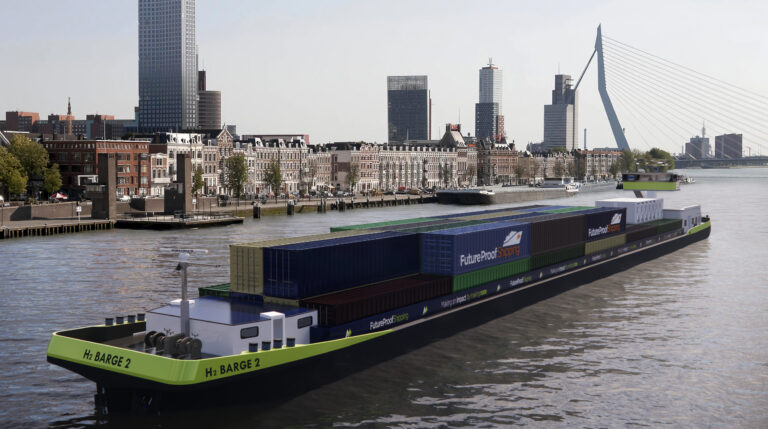Dutch shipowner Future Proof Shipping (FPS), the EU-funded Flagships project and the Interreg-funded ZEM Ports NS project have launched the H2 Barge 2 – a hydrogen-powered vessel that will ship goods completely emission-free on the Rhine between Rotterdam in the Netherlands and Duisburg in Germany.
The H2 Barge 2 is the first of two demonstrators in the Flagships project, and the second demonstrator of the ZEM Ports NS project. The vessel, which was originally the Fenny 1 and then the FPS Waal, was built as a conventionally powered containership.
During 2023, H2 Barge 2 was stripped of all combustion engines and fossil fuel tanks at Holland Shipyards Group (HSG) in Werkendam. Now, the vessel has a completely new 100% emission-free propulsion system including PEM fuel cells, hydrogen storage, battery packs and an electric drivetrain installed below deck. Six fuel cells from Ballard Power Systems raise the total power installed to 1.2MW.
H2 Barge 2 is expected to cut 3,000 tons of CO2 emissions annually when sailing the Rhine. With 80% of all cargo flows on the Rhine sailing between Rotterdam and Duisburg, the project stakeholders say that H2 Barge 2 proves that much of the fleet can be fully zero emission. The second demonstrator vessel in the Flagships project, Zulu 06, will be deployed in Paris in 2024.
Richard Klatten, CEO of Future Proof Shipping, said, “This is another proud moment for us. It proves moving cargo with zero emissions and zero impact is not only possible, it’s scalable too. Successfully launching our second hydrogen-powered inland cargo vessel is just as important an achievement as the first, not just for Future Proof Shipping, ZEM Ports NS and the Flagships project but for the future of green shipping. This vessel now sets the standard for inland shipping and beyond.”
Mirela Atanasiu, interim executive director of the Clean Hydrogen Partnership, said, “Inland waterways are important for freight transport in Europe. We are thrilled to see a high-power container vessel being converted to zero-emission. The H2 Barge 2 will bring knowledge on how to retrofit vessels from diesel combustion to zero-emission alternatives by using batteries in combination with green hydrogen in a fuel cell. I am proud to see that our funding contributes to the decarbonization of freight transport in the European Union.”
Ada Jakobsen, CEO of Maritime CleanTech, said, “This project proves collaboration across borders and companies is key to making the green shift in shipping happen. Getting new hydrogen vessels into operation is important if we are to speed up the green maritime transition. Together, we’re building new future fuel value chains crucial to meeting fast-approaching climate goals.”
Jyrki Mikkola, the Flagships project coordinator and senior scientist at the VTT Technical Research Centre of Finland, said, “We’ve been working hard for several years to get to this point. Having the first demonstrator on the Rhine is truly a great achievement by Future Proof Shipping and the rest of the partners. The aim of the Flagships project is to take zero-emission waterborne transport to an entirely new level. Now we’re one important step closer to reaching our goal.”
This project was made possible with funding support from the Interreg North Sea Region Programme (Zero Emission Ports North Sea – ZEM Ports NS), Flagships H2020 Project (Clean Hydrogen Partnership) and Netherlands Enterprise Agency (RVO).
For more key hydrogen updates from the electric and hybrid marine technology industry, click here.



